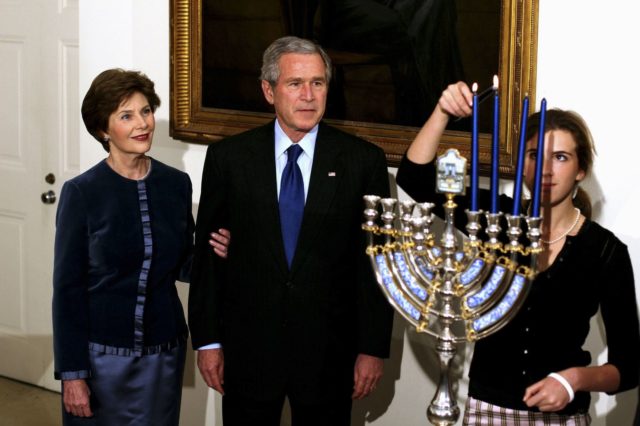On the evening of Sunday, Dec. 18, Jews across the globe will mark Hanukkah by lighting candles. The tradition originates in the 2nd-century B.C. triumph of a ragtag group of Judean rebels known as the Maccabees over the Syrian-Greek army of Antiochus IV Epiphanes. To mark the restoration of their nation’s independence, the Maccabees rededicated the Temple in Jerusalem, using a small jug of sacred oil to light the seven-branched candelabrum known as the menorah. Miraculously, the oil kept burning for eight days.
For American Jews, the holiday and the candle-lighting ritual serve to illuminate their role in the nation’s history.
For American Jews, the holiday and the candle-lighting ritual also serve to illuminate their role in the nation’s history. Louisa Hart, a 19th-century woman from Easton, Penn., recorded in her diary that George Washington once spent a winter evening in the home of her father Michael Hart, whom she described as “a Jew reverencing and strictly observant of the Sabbath and Festivals.” Writer Stephen Krensky used this meeting as the basis for his 2006 children’s book “Hanukkah at Valley Forge,” which imagines Washington drawing inspiration, during the harsh winter of 1777-78, from a Jewish soldier lighting his menorah.
There’s no evidence that Washington ever really saw Hanukkah being celebrated, but he certainly knew his Scripture and often evoked the Israelite prophets’ image of a tree as a symbol of liberty. In a 1790 letter to the Hebrew Congregation of Newport, R.I., Washington wrote, “May the Children of the Stock of Abraham, who dwell in this land, continue to merit and enjoy the good will of the other Inhabitants; while every one shall sit in safety under his own vine and fig tree, and there shall be none to make him afraid.”
In 1862, however, the first night of Hanukkah brought the worst act of anti-Jewish discrimination by the government in American history. Aiming to suppress cotton speculation during the Civil War, General Ulysses S. Grant ordered “Jews as a class” to leave the area under his jurisdiction, including parts of Kentucky, Mississippi and Tennessee, within 24 hours. A holiday meant to commemorate a fight for religious freedom now saw Jews experiencing expulsion and discrimination.
As the historian Jonathan Sarna has written, a man named Cesar Kaskel swiftly traveled from Paducah, Ky., to Washington, D.C., and met with President Abraham Lincoln to protest the decree. According to Kaskel’s later account, Lincoln referred to the biblical Israelites, asking: “And so the children of Israel were driven from the happy land of Canaan?” “Yes, and that is why we have come unto Father Abraham’s bosom, asking protection,” Kaskel replied. Lincoln swiftly revoked the order, and Grant himself later regretted his hasty action.
President Teddy Roosevelt alluded to his familiarity with the story of Hanukkah in a 1903 speech, noting that “When I was police commissioner of New York I had experience after experience of the excellent work done—excellent work needing nerve and hardihood, excellent work of what I might call the Maccabee type…by police officers of Jewish extraction.” In 1895, Roosevelt cheekily used 40 Jewish officers as bodyguards for an antisemitic German preacher making a controversial visit to New York, calling this “the very most effective answer that could possibly be made to him, and probably the best object lesson we could give of the spirit in which we Americans manage such matters.”
In advance of Hanukkah in 1906, Roosevelt wrote to the prominent Jewish leader Rabbi Stephen S. Wise wishing “hearty good will” to the Jewish immigrant children of the Riis Settlement. The president urged that “Jewish boys and girls should keep their pride in and admiration for their own heroes of early days,” which “instead of hindering them, will help them to the friendliest and most brotherly relations with all their fellow-Americans.”
When modern Israel’s first prime minister, David Ben-Gurion, visited the White House in 1951, he gave President Harry Truman a menorah that had been brought to the U.S. by German Jewish refugees from Nazism. The gift, delivered on Truman’s birthday, May 8, served to express Israel’s gratitude for American support. Decades later, in his 1987 Hanukkah message to the nation, President Ronald Reagan cited the Maccabean revolt as inspiring not only Israel’s rebirth but the struggle to free Soviet Jewry. Hanukkah’s message is “timeless,” Reagan said, and “its lessons inspire the struggles of today and the victories of tomorrow.”
In 2001, President George W. Bush instituted what has now become an annual tradition, the White House Hanukkah Party. Speaking just months after the terrorist attacks of Sept. 11, Mr. Bush noted that “America and Israel have been through much together…We can see the heroic spirit of the Maccabees lives on in Israel today, and we trust that a better day is coming, when this Festival of Freedom will be celebrated in a world free from terror.”
Last year, President Biden’s Hanukkah statement also noted the relationship between the Maccabees’ victory and the national character of the U.S., remarking that “At its core, Hanukkah recounts a story at the heart of the human spirit—one that is inherently Jewish and undeniably American.” The continuing commemoration of Hanukkah by American presidents reflects the enduring inspiration of the Maccabean story for all those who seek the light of liberty.


